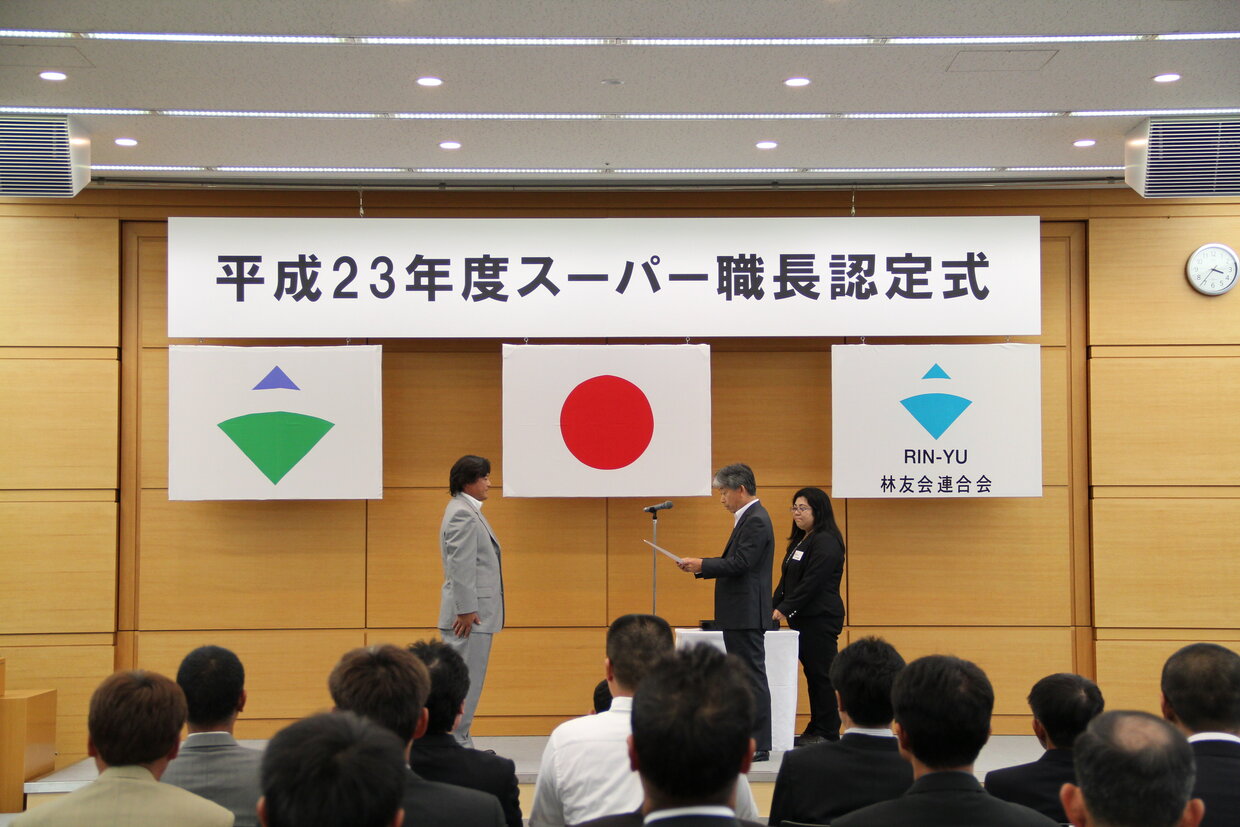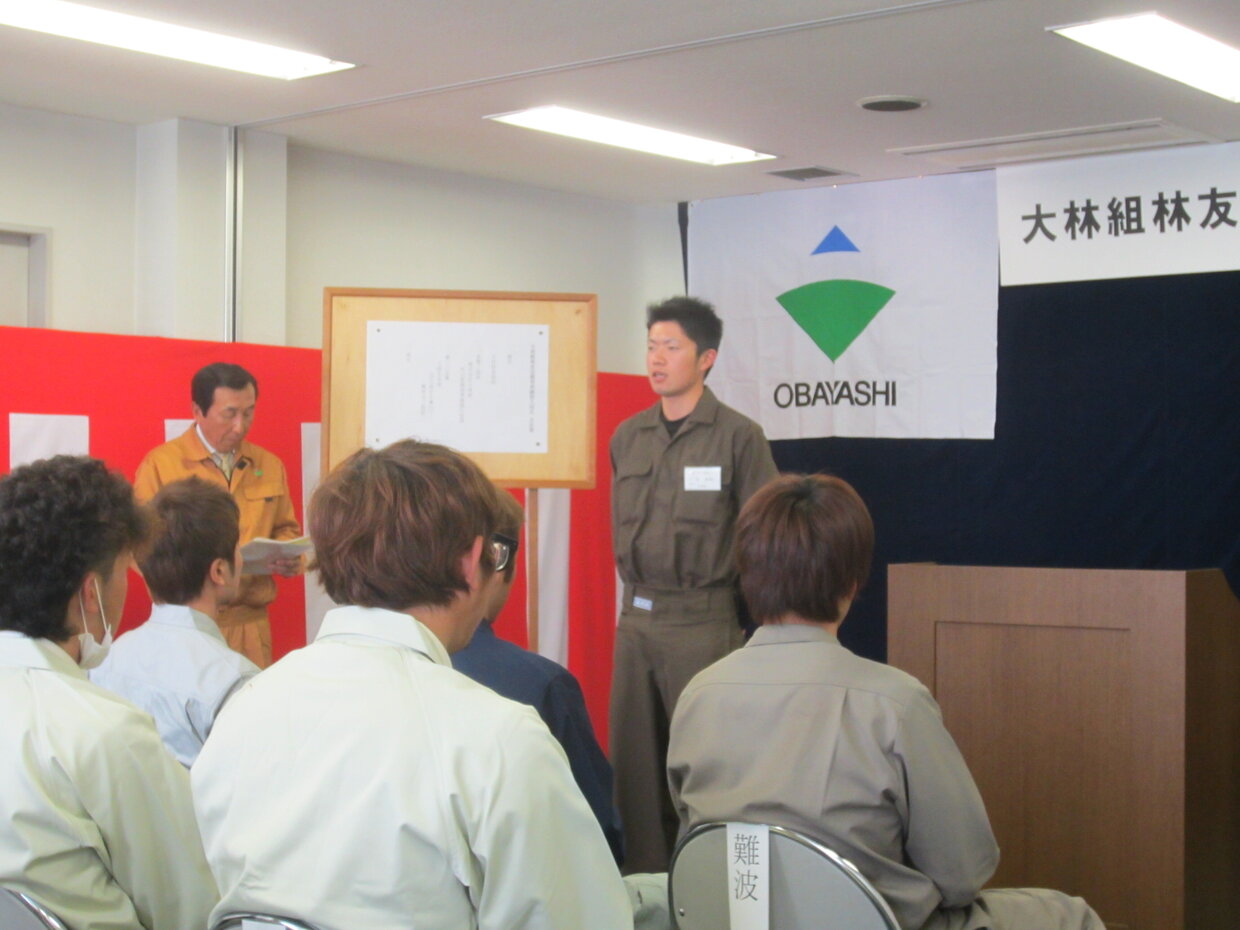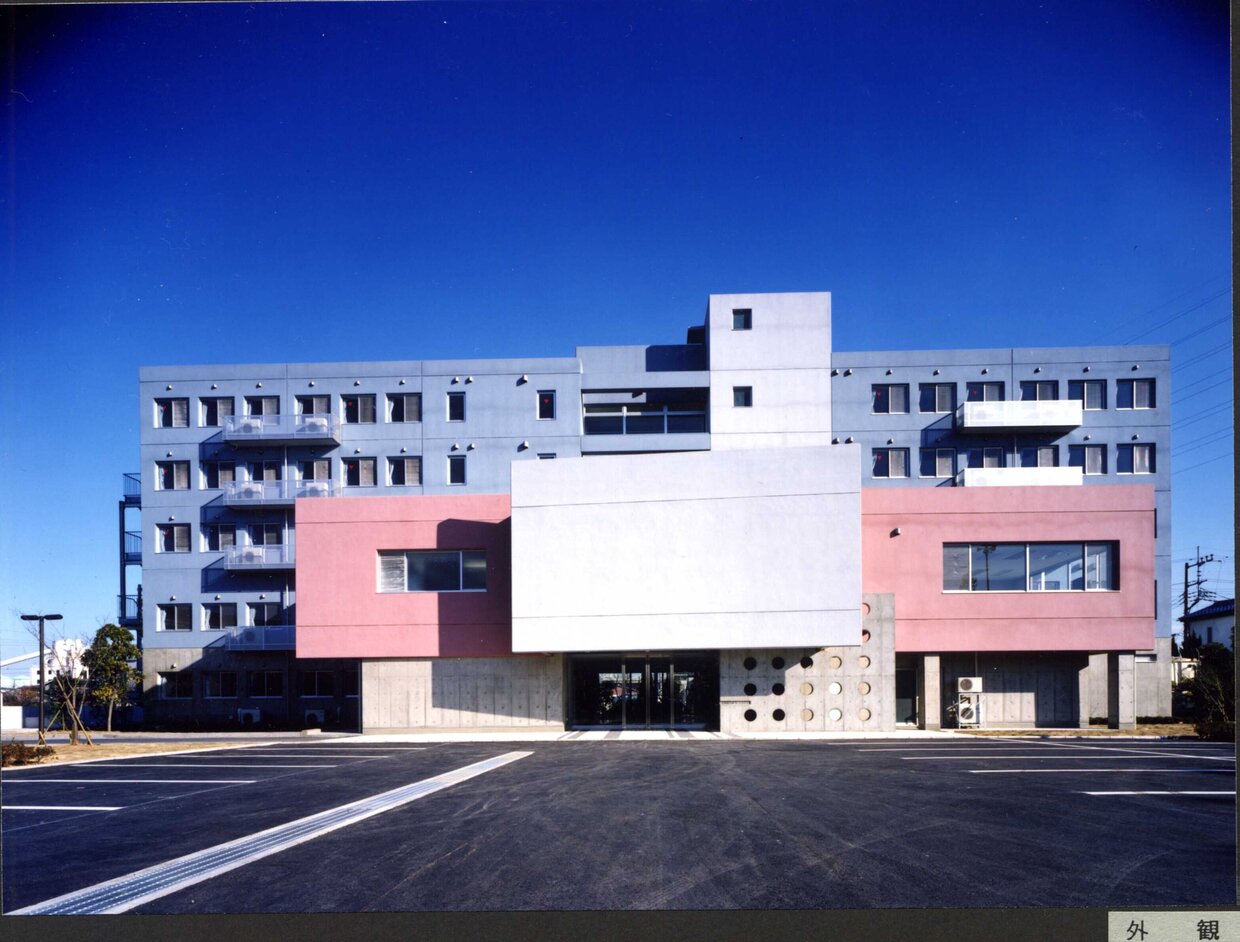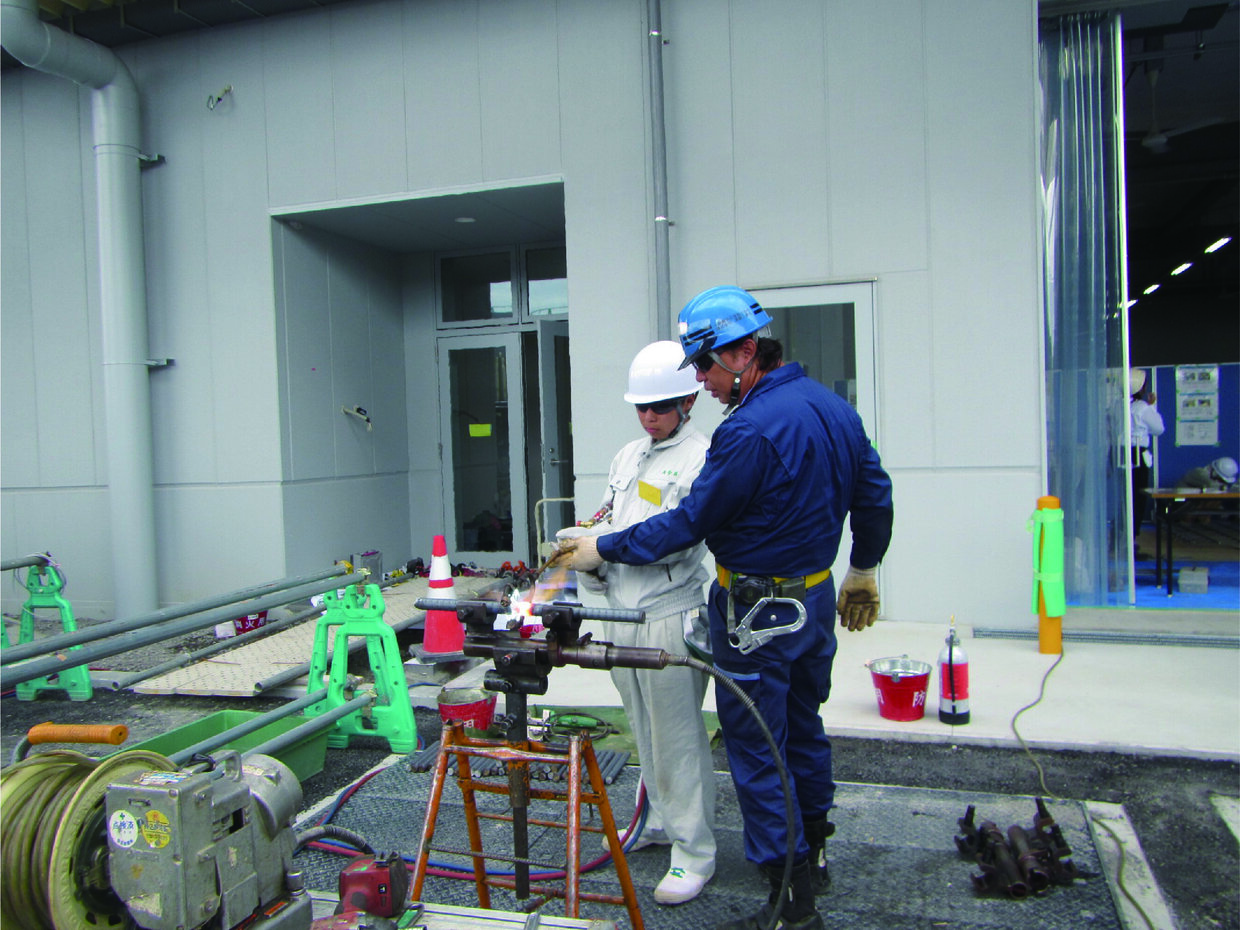Supporting Work-Life Balance and Passing on Expert Skills
Initiatives for Work-Life Balance
Obayashi Corporation promotes work-life balance on the basis of the Principles in the approach “We create amenable work environments where every one of our associates can work safely and with peace of mind while realizing his or her full potential.”
An issue pertinent to the construction industry was reducing total working hours at construction sites, and to address the problem, the company made efforts to encourage employees to take time off and to reduce overtime work. Alongside encouraging employees in all divisions to plan and take vacations before the start of long consecutive holidays, the company introduced a system for workers to take vacations during job transfers and also widened eligibility for taking half-day paid leave from construction site office workers to all employees. As a measure to reduce overtime work, the third Wednesday of every month was designated “No Overtime Day,” and employees are urged to leave the workplace on time.
The company also enhanced its initiatives for maintaining the health of employees. Periodic checkups are offered for all employees, and digestive system examinations are offered for employees who opt to undergo them. Eligibility for subsidies for complete medical checkups was extended to dependents in April 2011, as the company continued to promote the wellness of employees and their families. In 2002, the Obayashi Mutual Aid Association established a 24-hour, 365-day consultation service on all health-related issues, accessible to all employees and their families, both in Japan and overseas. Training is conducted every fiscal year to deepen employees’ understanding of mental health, and a mental health counseling service was established as a part of the company’s commitment to strategies for mental health.
Moreover, in accordance with the intent of the Act on Advancement of Measures to Support Raising Next-Generation Children, the company has formulated action plans since 2005 and continuously supported diverse work styles for employees during the period in which they are raising children. In the Fourth Action Plan (October 2011 to March 2015) formulated in FY2012.3, the company set a target of at least one male employee and at least 90 percent of female employees taking childcare leave during the duration of the action plan. Obayashi created a workplace in which the use of this company system is encouraged, and actively provides information about the system. In recognition of these efforts, the Ministry of Health, Labour and Welfare certified Obayashi as a company supporting childcare in October 2011, and awarded it the “Kurumin” mark certifying that the company supports raising the next generation of children. In April 2012, the company further enhanced its childcare leave program by extending the leave from one year and six months to two years.
A nursing care subsidy benefit was set up to subsidize home care services used by employees and their families as part of the company’s provision of nursing care benefits. The company also started offering a number of services, such as providing nursing care assistance information, holding nursing care seminars, and establishing consultation hotlines.
Labor and management regularly hold councils, such as the Labor-Management Council and Hygiene Committee, where participants discuss a wide range of topics related to work-life balance, from creating a comfortable workplace environment to promoting health management.
In April 2013, prior to the revised Labor Contract Act taking effect in April 2018, the company introduced a system for hiring “Area-shokuin.” This system enabled fixed-term employees who had been with the company for five or more consecutive years to have unlimited-term employment in areas within commuting distance of their homes.
Passing on Expert Skills and Initiatives to Secure Human Resources
In the construction industry, the shortage of skilled workers had become an urgent issue due to the aging of veteran skilled workers and the decreasing number of young people entering the industry, coupled with the demand for construction workers for reconstruction following the Great East Japan Earthquake and urban development projects for the Tokyo 2020 Olympic and Paralympic Games. To address situation, Obayashi Corporation set in motion initiatives to secure and train skilled workers.
One such initiative was the introduction of the Obayashi Excellent Site Supervisor Certification Program. This program was established to certify those who excel in supervising construction workers as an “Excellent Site Supervisor” and provide an additional fixed allowance commensurate with this certification. In FY2012.3, the first year of the program, 75 people in five occupational categories were certified as Excellent Site Supervisors. In FY2015.3, the number of eligible occupational categories was increased, and the number of Excellent Site Supervisors rose to 194 across 25 occupational categories.

In April 2014, the Obayashi Rin-yu-kai Vocational Training School was opened in the city of Yashio, Saitama Prefecture, by the company and Obayashi Rin-yu-kai Federation. The school’s purpose is to train executive candidates and Excellent Site Supervisor candidates at Rin-yu-kai member companies and to support the transfer of expert skills to young skilled workers. Initially, three courses in scaffolding, ferro-concrete reinforcement, and formwork were established for young skilled workers who had been with the company for two to five years. Trainees enrolled in the respective courses spend two months learning about construction management and safety management at Obayashi’s work sites, computer-aided design (CAD) drawing, and construction work based on process specifications. The school also helps prepare trainees for the skills test and acquire qualifications (skills training). The school began offering the scaffolding course when it opened in April 2014, the ferro-concrete reinforcement course in September of the same year, and the formwork course in January 2015. Since then, the school has continuously sought to improve its offerings by scaling up courses and expanding the number of trainees. The school has earned high praise for its innovative approach to human resource development. In April 2015, the Vocational Training School became the first general contractor designated by the Tokyo Metropolitan Government as a wide-area occupational training organization utilizing Ministry of Health, Labour and Welfare programs (e.g., the career development promotion subsidy).


The company also launched three new training programs for technical staff in FY2015.3 in its endeavors to pass on expert skills. The first of the programs was Training for New Hires (Building Construction) offered at the Fuji Education Training Center. Trainees participate in a one-week training camp and receive hands-on construction training at model construction sites covering the fundamentals of craftsmanship, including rebar and formwork assembly and measurements, marking, and material inspection. The second program launched was Training for Young and Mid-Career Employees (Building Construction). It offers craftsmanship training at a simulated construction site adjoining its Osaka Machinery Factory (now West Japan Robotics Center). Through training including detecting defects in rebar work, the program is designed to improve workers construction management skills and pass on expert skills of mid-career employees to young employees. The third program was Training for Newly Appointed Project Directors, offering training for veteran project engineers and young project directors.
Collaborating with Obayashi Rin-yu-kai
About 1,100 companies engaged in various types of work are members of Obayashi Rin-yu-kai, which is comprised of suppliers from across Japan. The association was established in Osaka in 1906 as an organization of subcontractors that worked exclusively with the company’s founder, Yoshigoro Obayashi, and later developed into region-based associations. Rin-yu-kai boasts a long history and will soon celebrate the 120th anniversary of its establishment.
Worker assignment was the main role of Rin-yu-kai when it was established. Today, it supports the hiring activities of member companies, puts efforts into labor-saving construction work and shorter delivery periods, and proposes operational improvements to the company. To honor suppliers and subcontractors for their achievements, the company has established systems, namely the Labor-Saving and Quick-Build Technology Award for construction in 2016 and the Supplier and Subcontractor Operational Improvement Award for civil engineering in 2017. Obayashi Corporation will continue to engage in craftsmanship with sincerity in collaboration with all people involved in its business.

Since FY2015.3, the company has held joint company introduction seminars for high schools in collaboration with Obayashi Rin-yu-kai. Hands-on occupational construction site tours are also held for high school and vocational school students.